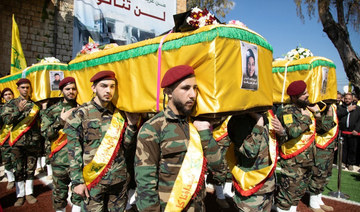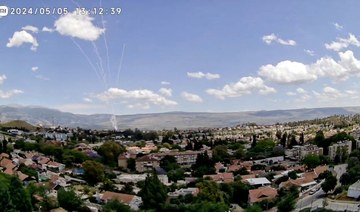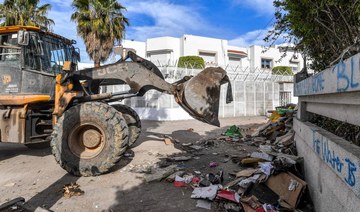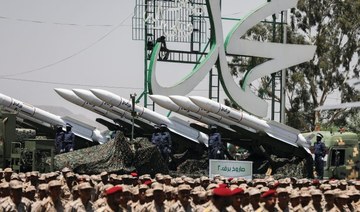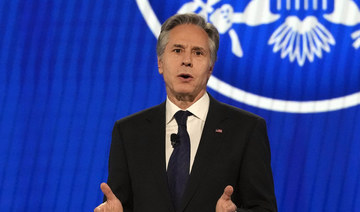RAFAH, Gaza Strip: The head of the main UN aid agency in the war-battered Gaza Strip warned late Saturday that its work is collapsing after nine countries decided to cut funding over allegations that several agency employees had participated in the deadly Hamas attack against Israel four months ago.
Philippe Lazzarini, head of the UN agency for Palestinian refugees, known as UNWRA, said he was shocked such decisions were taken as “famine looms” in the ongoing Israel-Hamas war. “Palestinians in Gaza did not need this additional collective punishment,” he wrote on X. “This stains all of us.”
His warning came a day after he announced he had fired and was investigating several agency employees over allegations that they participated in the Oct. 7 attack on Israel that sparked the war. The United States, which said 12 agency employees were under investigation, immediately said it is suspending funding, followed by several other countries, including Britain, Italy and Finland.
The agency, which has 13,000 employees in Gaza, most of them Palestinians, is the main organization aiding Gaza’s population amid the humanitarian disaster. More than 2 million of the territory’s 2.3 million people depend on it for “sheer survival,” including food and shelter, Lazzarini said, warning this lifeline can “collapse any time now.”
The Israel-Hamas war has killed more than 26,000 Palestinians, according to local health officials, destroyed vast swaths of Gaza and displaced nearly 85 percent of the territory’s 2.3 million people. The Hamas attack in southern Israel killed about 1,200 people, mostly civilians, and about 250 hostages were taken.
In Israel, Prime Minister Benjamin Netanyahu pushed back Saturday after the International Court of Justice ruling to limit death and destruction in the military’s Gaza offensive, declaring that “we decide and act according to what is required for our security.”
Among the first deaths reported since the ruling, witnesses said three Palestinians were killed in an airstrike that Israel said targeted a Hamas commander.
Israel’s military is under increasing scrutiny now that the top United Nations court has asked Israel for a compliance report in a month. The court’s binding ruling on Friday stopped short of ordering a ceasefire, but its orders were in part a rebuke of Israel’s conduct in its nearly 4-month war against Gaza’s Hamas rulers.
At least 174 Palestinians were killed over the past day, the Health Ministry in Gaza said. It does not distinguish between combatants and civilians in its tolls, but has said about two-thirds are women and children.
Israel holds Hamas responsible for civilian casualties, saying the militants embed themselves in the local population. Israel says its air and ground offensive in Gaza has killed more than 9,000 militants.
Israel’s military said it had conducted several “targeted raids on terror targets” in the southern city of Khan Younis in addition to the airstrike in nearby Rafah targeting a Hamas commander.
Bilal Al-Siksik said his wife, a son and a daughter were killed in the Rafah strike, which came as they slept. He said the UN court ruling meant little since it did not stop the war.
“No one can speak in front of them (Israel). America with all its greatness and strength can do nothing,” he said, standing beside the rubble and twisted metal of his home.
More than 1 million people have crammed into Rafah and the surrounding areas after Israel ordered civilians to seek refuge there. Designated evacuation areas have repeatedly come under airstrikes, with Israel saying it would go after militants as needed.
In Muwasi, a narrow coastal strip once designated as a safe zone but struck in recent days, displaced Palestinians tiptoed on sandaled feet through garbage-lined puddles in damp and chilly weather. Walls of sheets and tarps billowed in the wind. A mother wept after rain leaked in and soaked the blankets.
“This is our life. We have nothing and we left (our homes) with nothing,” said Bassam Bolbol, whose family ended up in Muwasi after leaving Khan Younis and finding no shelter in Rafah.
Frustration with the uncertainty grows. As thousands of Gazans fled Khan Younis toward Muwasi, Israel shared video showing a crowd appearing to call for bringing down Hamas.
The case brought by South Africa to the UN court alleged Israel is committing genocide against Gaza’s people, which Israel vehemently denies. A final ruling is expected to take years.
The court ordered Israel to urgently get aid to Gaza, where the UN has said aid entering the territory remains well below the daily average of 500 trucks before the war. The UN also says access to central and northern Gaza has been decreasing because of “excessive delays” at checkpoints and heightened military activity.
The World Health Organization and the medical charity MSF issued urgent warnings about the largest health facility in Khan Younis, Nasser Hospital, saying remaining staff could barely function with supplies running out and intense fighting nearby.
WHO footage showed people in the crowded facility being treated on blood-smeared floors as frantic loved ones shouted and jostled. Cats scavenged on a mound of medical waste.
“These are the only painkillers left we have. If you want to count them, they are only for maybe five or four patients,” Dr. Muhammad Harara said.
Gaza’s Health Ministry spokesperson Ashraf Al-Qidra said in a statement that Nasser Hospital lacked anesthesia and other medicines for intensive care units and had “dangerous” shortages of blood.
The United States, Israel’s closest ally, has increasingly called for restraint and for more humanitarian aid to be allowed into Gaza while supporting the offensive.
More mediation lies ahead in search of a deal to secure the release of hostages who remain captive in Gaza. Over 100 were released in a swap for Palestinian prisoners during a week-long ceasefire in November. An unspecified number of the remaining 136 are believed to be dead.
The US CIA director will meet in Europe with the head of the intelligence agencies of Israel and Egypt and with the prime minister of Qatar, according to three people familiar with the matter who insisted on anonymity to discuss the sensitive talks.
Netanyahu in his address said he would not take back “a single word” of his earlier criticism of Qatar, again accusing it of hosting Hamas leaders and funding Hamas.
“If they position themselves as a mediator, so please, let them prove it and bring back the hostages, and in the meantime deliver the medicines to them,” he said.
While the prime minister’s comments appeared to be aimed at his right-leaning base of supporters, other Israelis again gathered in Tel Aviv and outside Netanyahu’s residence in Jerusalem to call for new elections, frustrated with the government’s failure to bring all hostages home. Israel also was marking International Holocaust Remembrance Day, alongside other countries around the world.
Hamas has said it will only release the hostages in exchange for an end to the war and the release of large numbers of Palestinian prisoners held by Israel.
Embattled UN agency warns its aid operation in Gaza is ‘collapsing’ over a wave of funding cuts
https://arab.news/cspq6
Embattled UN agency warns its aid operation in Gaza is ‘collapsing’ over a wave of funding cuts
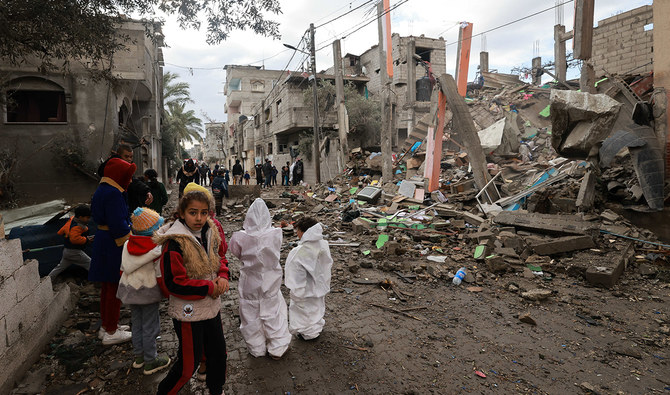
- 9 countries decided to cut funding to agency over allegations several employees participated in Oct. 7 attacks against Israel
- The agency, which has 13,000 employees in Gaza, most of them Palestinians, is the main organization aiding Gaza’s population
80,000 Palestinians flee Rafah since Israel hiked operation this week: UN agency

RAFAH: The United Nations agency supporting Palestinian refugees said Thursday that about 80,000 people had fled Rafah in the three days since Israel intensified military operations in the south Gaza city.
“Since Israeli forces military operation intensified on 6 May, around 80,000 people have fled Rafah, seeking refuge elsewhere,” UNRWA said on X, formerly Twitter, warning that “the toll on these families is unbearable. Nowhere is safe.”
Israeli strike on Lebanon kills four Hezbollah fighters, security sources say
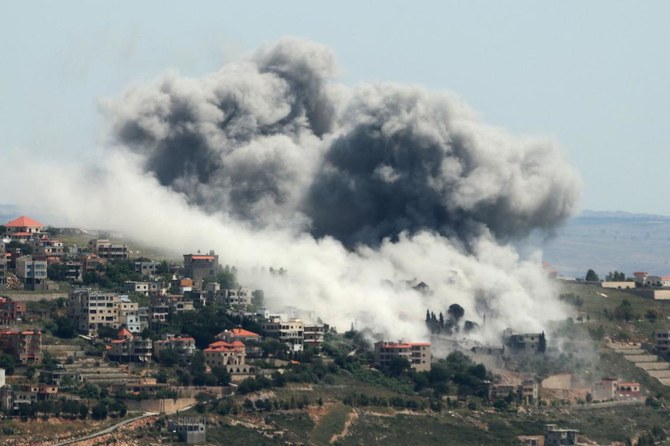
- Israeli military did not immediately comment on Thursday’s strikes
- Lebanon’s civil defense rescue force said it had pulled four bodies out of a car that had been scorched by an Israeli strike
BEIRUT: An Israeli air strike on a car in southern Lebanon killed four people on Thursday, according to Lebanon’s civil defense, with security sources saying those killed were members of armed group Hezbollah.
The conflict between Hezbollah and Israel has rumbled on since October in parallel to the Gaza war, with an escalation this week as both sides intensified their bombardment, fueling concern of a bigger war between the heavily-armed adversaries.
Israel has used artillery, drones and warplanes against targets in southern Lebanon, including to strike fighters from Hezbollah and other armed groups. Fighters in Lebanon have launched rockets and their own drones into northern Israel.
The Israeli military did not immediately reply to a request for comment on Thursday’s strikes.
Lebanon’s civil defense rescue force said it had pulled four bodies out of a car that had been scorched by an Israeli strike. Two security sources told Reuters the four killed were members of Hezbollah.
The exchanges of fire have uprooted tens of thousands of people on both sides of the border. In northern Israel, the displacement has prompted calls for firmer military action against Hezbollah.
Israeli Defense Minister Yoav Gallant warned on Wednesday that the next months “may be a hot summer,” saying either a diplomatic deal or military solution was needed to restore security.
The fighting between Israel and Hezbollah has been the most intense since they went to war in 2006.
Hezbollah has repeatedly said that it will cease fire when the Israeli offensive in Gaza stops, but that it is also ready to fight on if Israel continues to attack Lebanon.
Activist in Tunisia arrested as conditions for migrants and their advocates worsen
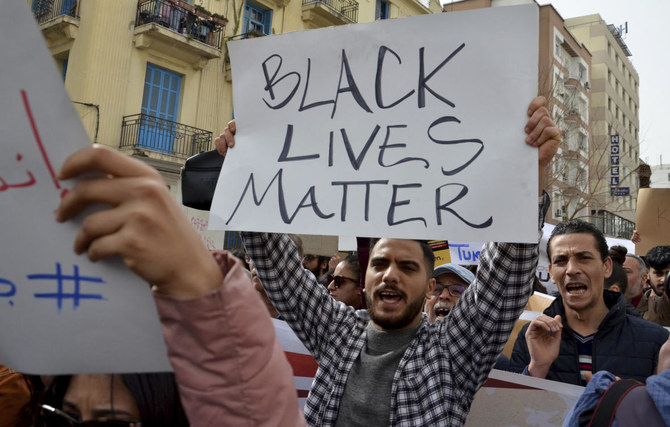
- Saadia Mosbah, who is Black, was taken into custody and her home was searched
- She was arrested after she posted on social media condemning the racism she faced
TUNIS, Tunisia: An anti-discrimination activist in Tunisia was arrested in a money laundering investigation this week as the dangerous and dire conditions facing migrants and their advocates worsen.
Saadia Mosbah, who is Black, was taken into custody and her home was searched as part of an investigation into the funding for the Mnemty association she runs.
She was arrested after she posted on social media condemning the racism she faced for her work from people accusing her of helping sub-Saharan African migrants, said Bassem Trifi, the president of the Tunisian League for the Defense of Human Rights.
Her arrest was the latest reflection of the problems facing migrants in Tunisia as authorities bolster efforts to police the shoreline where many embark on boats hoping to reach Europe.
In a national security council meeting focused on irregular migration, Tunisian President Kais Saied said Tuesday that associations that receive substantial foreign funds were “traitors and agents” and shouldn’t supplant the state’s role in managing migration and fighting human trafficking.
Fewer migrants have made the dangerous journey across the Mediterranean Sea this year due to weather and beefed-up border security. But human rights groups caution that efforts to curb crossings haven’t protected the tens of thousands of migrants stuck in Tunisia.
More than 80 migrants were arrested in Tunis last week after clashes with law enforcement as they cleared encampments in the capital that were “disturbing the peace,” according to Tunisia’s Radio Mosaique.
Hundreds of migrants had camped near the headquarters of the UN refugee agency and International Organization for Migration, often demanding the agencies repatriate them outside of Tunisia. Law enforcement used heavy machinery to raze their tents and then bused them outside of the city to “an unknown destination,” said Romdhane Ben Amor, a spokesman for the Tunisian Forum for Economic and Social Rights.
“Tunisia is deepening the crisis and promoting the idea that there is no solution,” Ben Amor told Radio Mosaique.
An estimated 244 migrants — most of them from outside Tunisia — have died or disappeared along the country’s Mediterranean coastline this year, including 24 whose bodies were found last week, the NGO said.
In a report based on government data released Monday, it noted that the number of migrants without papers boating across the Mediterranean had decreased as Tunisian authorities report an increasing number of interceptions. Such is the case for both migrants from Tunisia and migrants passing through the country en route to Europe.
In April, authorities directly thwarted 209 migration attempts and in total prevented more than 8,200 migrants from reaching Italy, the majority from sub-Saharan African countries. Tunisian Coast Guard have prevented more than 21,000 migrants from reaching Italy this year.
Managing migration to prevent scenes of chaos and despair along Italian shorelines has been a top priority for European leaders, including Italian Premier Giorgia Meloni, who has visited Tunis four times this year.
North African and European officials have sought to curb human trafficking and better police borders and coastlines to prevent deaths at sea. However, thousands of migrants fleeing conflict, poverty, persecution or hoping for a better life have continued to make the journey. They take boats from the coast north of Sfax, Tunisia’s second-largest city, to Italian islands such as Lampedusa, about 130 kilometers (81 miles) away.
The European Union hopes to limit migration with policies including development assistance, voluntary return and repatriation for migrants and forging closer ties with neighboring governments that police their borders. They have pledged billions of dollars over the past year to countries including Tunisia, Mauritania and Egypt to provide general government aid, migrant services and border patrols.
Though European leaders have hailed a $1.1 billion agreement with Tunisia as a template, Saied has pledged not to allow the country to become a “border guard” for Europe.
Less than one-third as many migrants have reached Italy in 2024 as had at this point last year, according to May 8 figures from Italy’s Interior Ministry. The UN refugee agency reported that more than 24,000 migrants traveled from Tunisia to Italy in the first four months of 2023 while less than 8,000 had successfully made the journey over the same time period this year.
Yemen’s Houthis say they targeted ships in Gulf of Aden, Indian Ocean
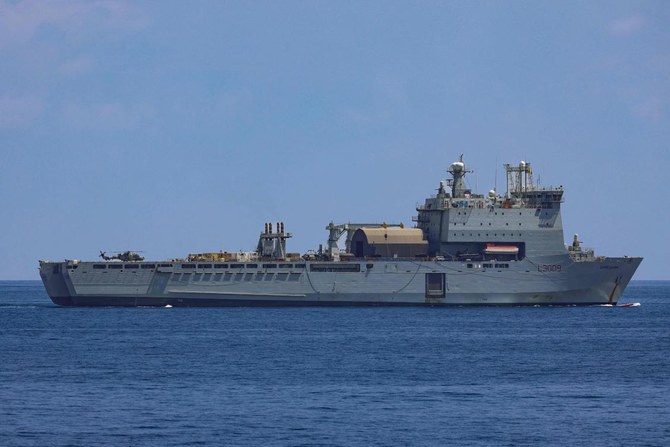
- The group also targeted the MSC VITTORIA in the Indian Ocean and again in the Gulf of Aden
DUBAI: Yemen’s Houthis on Thursday claimed two missile attacks in the Gulf of Aden on two Panama-flagged container ships that caused no damage, while also saying they targeted a ship in the Indian Ocean in a previously unreported assault.
The claims by Brig. Gen. Yahya Saree come as the tempo of the militia attacks have waned in recent weeks as they’ve been targeted by repeated airstrikes launched by a US-led coalition warship in waterways crucial to international trade. The Houthis insist their assaults will continue as long as Israel’s war on Hamas in the Gaza Strip goes on.
Saree in a prerecorded statement claimed attacks on the MSC Diego and MSC Gina. The Joint Maritime Information Center, a US-led coalition of nations operating in the Mideast, said those two missile attacks happened early Tuesday.
“Neither were hit and all crew on board are safe,” the center said. “The vessels were last reported proceeding to next port of call.”
The center added that the vessels were “likely targeted due to perceived Israeli affiliation.”
Both vessels were operating for Geneva-based Mediterranean Shipping Co., which did not immediately respond to a request for comment.
Saree did not say why it took the militia two day to claim the attacks. He also claimed the Houthis targeted the MSC Vittoria, another container ship, in the Indian Ocean. An attack on that vessel, however, has not been acknowledged by any authorities.
The Houthis say their attacks on shipping in the Red Sea and Gulf of Aden are aimed at pressuring Israel to end its war against Hamas in Gaza, which has killed more than 34,000 Palestinians there. The war began after Hamas-led militants attacked Israel on Oct. 7, killing 1,200 people and taking some 250 others hostage.
The Houthis have launched more than 50 attacks on shipping, seized one vessel and sunk another since November, according to the US Maritime Administration. Shipping through the Red Sea and Gulf of Aden has declined because of the threat.
Monitor, Iraqi group say Israel hits facilities in Syria
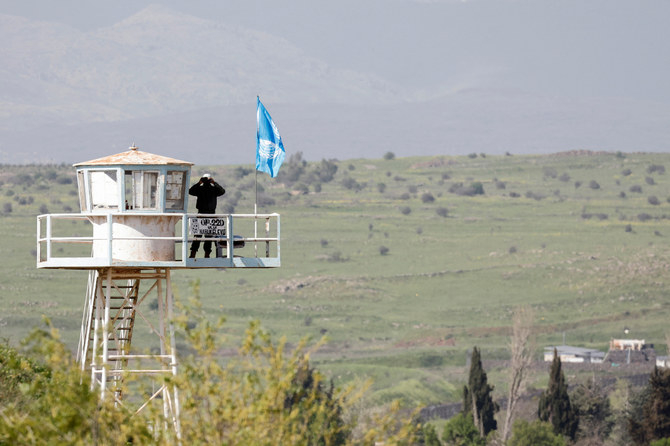
- The Syrian Observatory for Human Rights said “Israeli air strikes targeted a cultural center” and a “training facility” of the Iraqi Al-Nujaba movement
- Three members of the Iraqi group were wounded
BEIRUT: Israeli strikes on Syria early Thursday targeted facilities belonging to Iraq’s Al-Nujaba armed movement, a war monitor and the pro-Iran group said, with Damascus saying an unidentified building was attacked.
Israel has carried out hundreds of strikes in Syria since the outbreak of the civil war in its northern neighbor in 2011, mainly against army positions and Iran-backed fighters.
But the strikes increased after Israel’s war with Hamas in the Gaza Strip began on October 7, when the Iran-backed Palestinian militant group launched an unprecedented assault on Israel.
The Syrian Observatory for Human Rights said “Israeli air strikes targeted a cultural center” and a “training facility” of the Iraqi Al-Nujaba movement in the Sayyida Zeinab area south of Damascus.
Three members of the group were wounded according to the Britain-based Observatory, which relies on a network of sources inside Syria.
A source within the Iraqi faction, requesting anonymity as they were not authorized to speak to the media, confirmed that a “cultural center” belonging to the group was destroyed in the “Israeli” attack, but reported no casualties.
Al-Nujaba does “not have a declared military base in Syria,” the source added.
Syria’s defense ministry said that “at around 3:20 am today, the Israeli enemy launched an air attack from the direction of the occupied Syria Golan Heights targeting a building in the Damascus countryside.”
The attack caused “some material damage,” said the statement carried by state media, adding that air defense systems shot down some of the missiles.
The Sayyida Zeinab area is home to an important Shiite Muslim shrine that is protected by pro-Iran groups, including Lebanon’s Hezbollah, alongside the Syrian army, according to the Observatory.
The Al-Nujaba movement is part of a pro-Iran alliance in Iraq that Washington has blamed for numerous attacks on its forces.
Israel rarely comments on individual strikes on Syria, but has repeatedly said it will not allow its arch-enemy Iran to expand its presence there.
An April 1 raid blamed on Israel levelled Tehran’s consulate in Damascus and killed seven Iranian Revolutionary Guards, two of them generals.
That strike prompted Iran to launch a first-ever direct missile and drone attack against Israel on April 13-14 that sent regional tensions spiralling.





